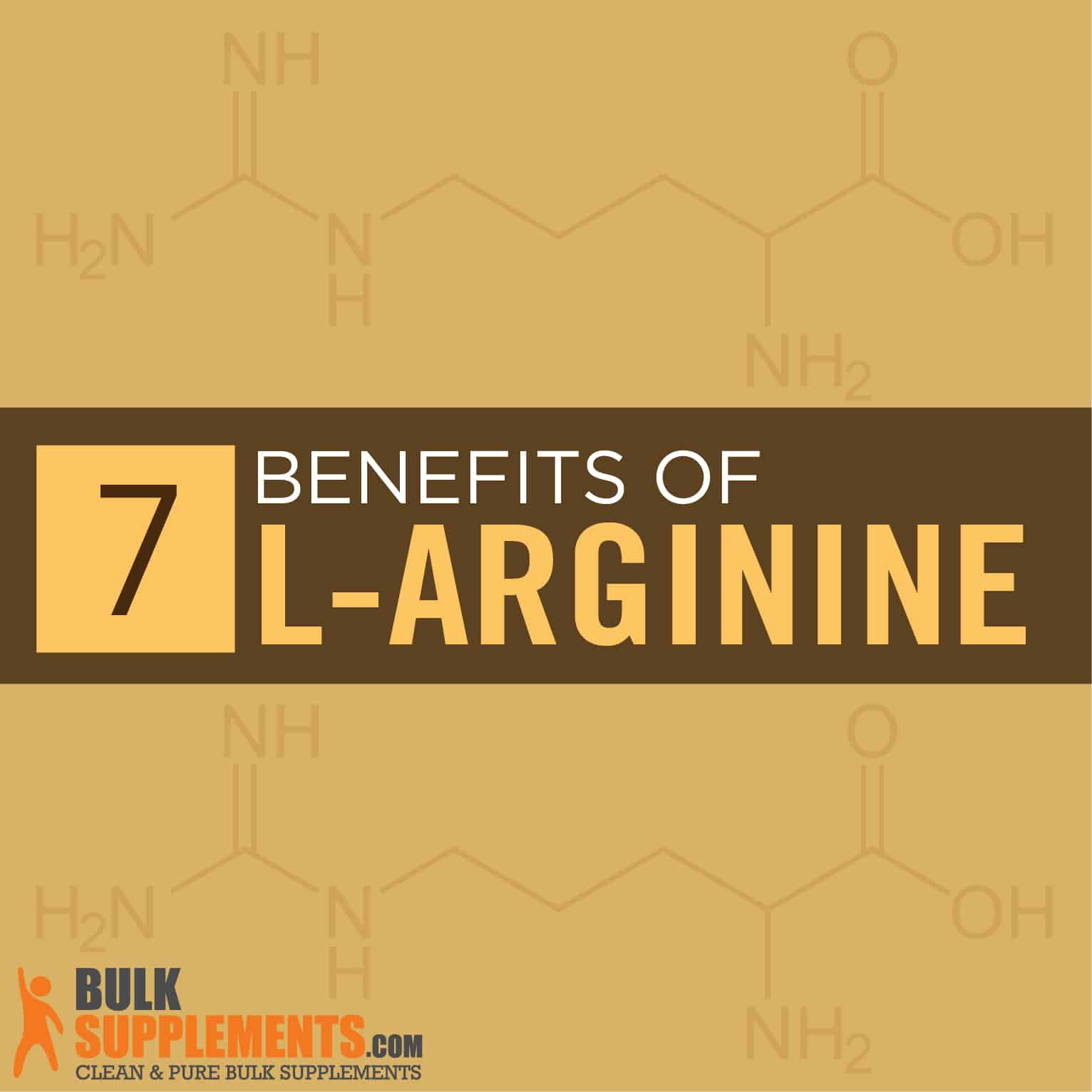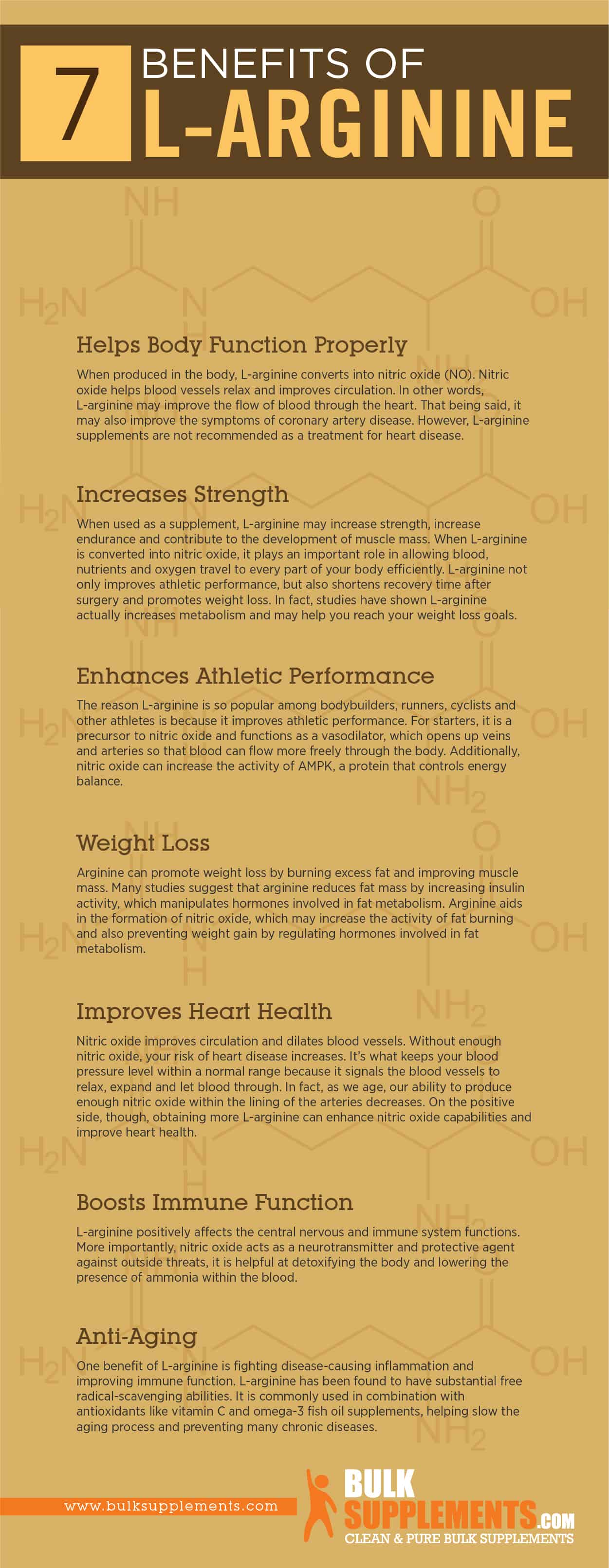4 Ways L-Arginine Benefits the Body & How to Use It
by James Denlinger Digital Marketing Strategist
Arginine is one of the 20 amino acids in the body. As a supplement, research suggests that l-arginine benefits natural processes in the body. Two of its most important functions are to help build and repair muscle tissues and to release nitric oxide into the bloodstream for vasodilation. L-arginine is available in some of our foods, but when that’s not enough to satisfy the body’s needs, we can get it in supplemental forms. Keep in mind, there’s no medical evidence to support l-arginine as a cure or treatment for any disease.
What is L-Arginine?
L-arginine is a semi-essential amino acid. Although the body can make it on its own, some people may have low arginine levels, such as vegans, vegetarians or people with certain health conditions. This can keep the body from functioning properly. Amino acids are called “building blocks” because they, including l-arginine, are involved in the biosynthesis of proteins.
Amino acids are also classified as essential or nonessential. The nonessential group includes the semi-essential subgroup (l-arginine and histidine). Essential amino acids (leucine, isoleucine, lysine, methionine, phenylalanine, threonine, tryptophan, valine) are not manufactured by the body and must be consumed from our food sources. Nine of the twenty amino acids fall into this category. On the other hand, nonessential amino acids are made in the body.
What Foods Have L-Arginine?
Overall l-arginine is found in high-protein foods, both animal- and plant-based.
Animal-based foods include:
- Dairy: milk, cheese, yogurt, eggs
- Red meat: beef, pork
- Poultry: chicken, turkey
- Seafood: fish, shellfish
Plant-based foods include:
- Legumes: soybeans, chickpeas, lentils, raw peanuts
- Vegetables: leafy greens, seaweed
- Nuts: walnuts, brazil nuts, almonds
- Seeds: sesame, pumpkin, sunflower
History of Research on L-Arginine
German chemist Ernst Schulze and his assistant Ernst Steiger were the first to isolate L-arginine in 1886. They isolated it from the seedlings of the lupin/ lupine plant. Its structure was discovered by Ernst Schulze and Ernst Winterstein in 1897. SG Hedin discovered mammalian l-arginine in 1895-96.
What Is L-Arginine Used For?
What are the benefits of l-arginine? The amino acid is involved in a number of bodily processes. For example, the amino acid is naturally involved in cardiovascular health. Other possible health benefits include:
- Blocked arteries/ high blood pressure
- Angina
- Repairing and building muscle tissue/ enhancing workout performance
- Healing wounds
- Controlling blood sugar levels in diabetes
- Boosting the immune system
- Reducing inflammation
- Stimulating growth hormone
- Treating/ preventing preeclampsia
- Assisting with natural aging
Cardiovascular Health
One of the major functions l-arginine performs in the body is cardiovascular health. A number of studies suggest it may benefit patients with high blood pressure, angina and coronary artery disease.
High Blood Pressure
In studies, researchers tested the effect of l-arginine supplements and noticed that they markedly reduced the subjects’ blood pressure. The researchers conducted 11 studies on 387 individuals for at least a month. Every case showed a decrease in both top (systolic) and bottom (diastolic) blood pressure numbers.
Angina
In one study, researchers tested eight patients with microvascular angina pectoris. Half of them were given l-arginine and the other half a were given placebo. Those who received the l-arginine dosage saw improved vasodilation (widening blood vessels), easing their chest pain.
Coronary Artery Disease
Researchers studied the effects on forearm blood flow by giving intravenous dextrose 5% infusion of D- and L-arginine to 22 patients with stable coronary artery disease. The subjects also performed a 20-minute treadmill exercise. Results showed that l-arginine stimulated an insulin-dependent nitric oxide release to improve coronary vasodilation and subsequent blood flow.
Sexual Health
Another of l-arginine’s uses is for sexual health for both men and women—arousal, fertility and erectile dysfunction (ED). How does l-arginine help ED? There are numerous causes for this condition, but the bottom line is a lack of blood flow to the penis. Several studies show supplementation with l-arginine for men may improve nitric oxide production which may help stimulate and relax the penile muscle.
In a six-week study, 50 men with ED were given either a high-dosage of l-arginine or a placebo, a questionnaire and a diary to log sexual activity. 31% of the subjects and two of the placebo subjects reported significant increase in activity. This study suggests that l-arginine supplements may help improve cases of erectile dysfunction. However, always consult your healthcare provider for diagnoses and accurate medical information before consuming supplements for any disease or medical condition.

How L-Arginine Benefits the Body
As previously noted, l-arginine is involved in many significant functions in the body, including heart health. But how exactly does it operate? What does L-arginine do in the body?
L-arginine is converted into nitric oxide by enzymatic reaction involving citrulline. How does l-arginine help the heart? Natural nitric oxide synthesis helps to reduce the risk of heart disease by relaxing or vasodilating the smooth muscle tissue of the blood vessels, which helps to improve blood circulation and reduce pressure on the heart.
How does l-arginine help sexual function? Studies not only show l-arginine’s ability to increase penile blood flow for sustained erection, but it may also increase sperm count and motility. Studies also suggest that l-arginine may increase blood flow and promote stimulation to female sexual organs.
Synthesizing Citrulline
Citrulline or l-citrulline is closely related to l-arginine. For starters, it’s also an amino acid. It was isolated by Japanese scientists Koga and Odake in 1914 from watermelon juice. In fact, its name is from the Latin word for watermelon, Citrullus lanatus.
Citrulline is produced during the metabolism of l-arginine (and ornithine, another nonessential amino acid) by two enzymes—argininosuccinate synthetase (ASS) and argininosuccinate lyase (ASL). These two enzymes trigger the chemical reaction. When citrulline enters the kidney, it reverts back into l-arginine, which is then converted into nitric oxide in the smooth cells lining the body’s blood vessels. Enzymes are critical to the body’s metabolic chemical processes. These substances act as catalysts, triggering and initiating such reactions.
Vasodilation and Blood Flow
Vasodilation has been mentioned earlier in conjunction with circulation, but what exactly does it entail? It’s simply the widening or dilation of blood vessels. The process allows blood to circulate easily as it transports oxygen and nutrients to the body’s cells and removes cell waste. Vasodilation can be triggered by organic or external influences and can have both beneficial and adverse effects on the body. Beneficial vasodilation promotes healthy cardiovascular function and sexual function in both men and women as we have seen.
L-arginine acts as a vasodilator in its nitric oxide state by triggering the widening of the endothelial cells in the smooth-muscle walls of blood vessels and in the sexual organs. Nitric oxide can also prevent blood clots and reduce inflammation to prevent plaque from forming in the blood vessels.
How to Take L-Arginine
Besides food, l-arginine is also made into supplements. However, supplements are not standardized or regulated by the United States Food and Drug Administration (FDA). Recommended dosages for the following supplement powders are based on a 2,000-calorie diet without daily values. Before taking any supplement, consult a doctor to confirm safety and avoid unwanted side effects.
- L-arginine base powder – 750 mg one to three times a day on an empty stomach
- L-arginine HCL (hydrochloric acid) powder – 750 to 1,500 mg daily on an empty stomach
- L-arginine L-pyroglutamate powder – 1,500 mg daily on an empty stomach
When is the Best Time to Take L-Arginine?
Research indicates that the best time to take l-arginine is about 30 minutes to an hour before exercising or at rest (x). However, always consult your healthcare provider before taking l-arginine as a dietary supplement.
How Long Does L-Arginine Stay in Your System?
Studies concerning l-arginine timeline in the body seem to be based on various factors, including whether l-arginine was consumed naturally in food or as a dietary supplement. One study suggests intestinal absorption occurs quickly after consumption. Another shows that the condition returns to abnormal after a 6-month daily treatment.
What are the Side effects of L-Arginine?
Is l-arginine safe? Generally, yes. But l-arginine can cause side effects, like any other supplement, especially in excessive dosages. It may also interact with medicines and herbs that a patient may take for pre-existing conditions. Always consult your healthcare provider for diagnoses and accurate medical information before consuming any supplement. Common side effects may include:
- Vomiting
- Nausea
- Diarrhea
- Bloating
- Inflammation in the airways
- Stomach pain
- Bloating
L-arginine may worsen some pre-existing conditions, such as cirrhosis of the liver, asthma, herpes, low blood pressure, kidney disease and pancreatitis. It may also negatively affect patients who have had recent heart attacks. Patients with any of these pre-existing conditions should use caution taking l-arginine supplements. In addition, women who are pregnant or breastfeeding should exercise caution with l-arginine and seek a doctor’s approval before using it.
Where to Buy L-Arginine
You can purchase pure l-arginine supplements in capsule form at BulkSupplements.com. The company is an industry-leading manufacturer and distributor for pure dietary supplements. BulkSupplements.com is not just a consumer brand. It also supplies pure ingredients to other food and supplement brands to make their products. All products at BulkSupplements.com are manufactured and tested according to current and proper manufacturing practices.
Are you interested in trying l-arginine to potentially benefit cardiovascular health and promote healthy circulation? Visit BulkSupplements.com to place an order today.
Bottom Line
L-arginine is a semi-essential amino acid. The body produces it naturally and it is also found in high-protein foods. In the body, l-arginine naturally synthesizes nitric oxide, primarily in the kidneys. Nitric oxide plays a huge role in vasodilation, which supports healthy circulation.
Studies show l-arginine may potentially benefit cardiovascular and sexual health (ED, fertility) in both men and women, immune system health, workout endurance, muscle growth and repair, blood pressure and inflammation. L-arginine supplements may also act as a vasodilator and potentially play a positive role in cardiovascular disorders and sexual function.
L-arginine supplements can create a myriad of mild to severe side effects, but it is generally safe in appropriate doses. However, l-arginine supplements may also negatively interact with some medications or pre-existing health conditions. To be safe, always consult your healthcare provider before taking any supplement.
Sponsor Ads
Created on Feb 24th 2020 17:33. Viewed 247 times.



